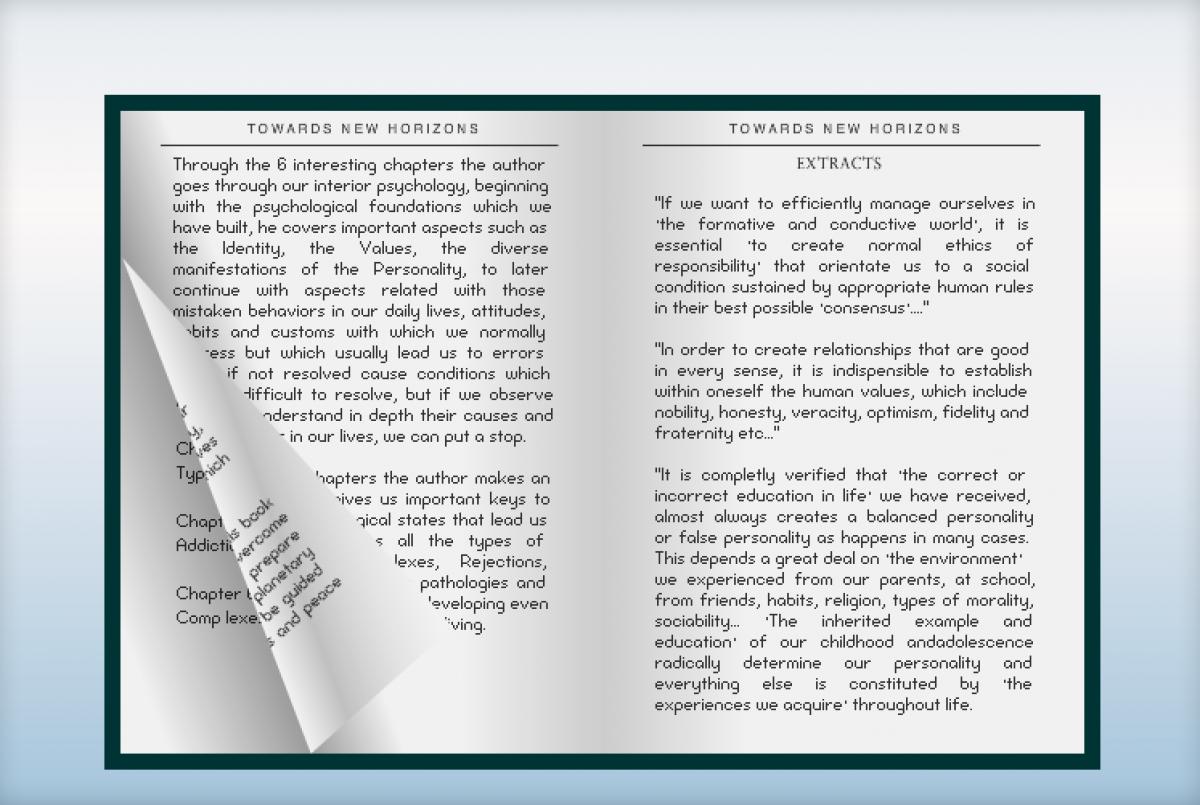Extracts of "Towards New Horizons"
- font size decrease font size increase font size
We present to you a few extracts of the treatise of Psychology and Sociology helps us seek solutions to many mistaken aspects of our lives and to go deeper into those strategies and skills that we need to develop in order to confront our daily lives:
If we want to efficiently manage ourselves in ‘the formative and conductive world’, it is essential ‘to create normal ethics of responsibility’ that orientate us to a social condition sustained by appropriate human rules in their best possible ‘consensus’....
In order to create relationships that are good in every sense, it is indispensible to establish within oneself the human values, which include nobility, honesty, veracity, optimism, fidelity and fraternity etc...
It is completly verified that ‘the correct or incorrect education in life’ we have received, almost always creates a balanced personality or false personality as happens in many cases. This depends a great deal on ‘the environment’we experienced from our parents, at school, from friends, habits, religion, types of morality, sociability... ‘The inherited example and education’ of our childhood andadolescence radically determine our personality and everything else is constituted by ‘the experiences we acquire’ throughout life.
In short, ‘uncleanliness’ from any perspective is a bad habit that forms part of the mediocre and vulgar man, who only thinks of his own dirtiness or perhaps does not even think about it at all; by nature, he is simply dirty, untidy and scruffy, be it his body or where he lives, and nothing else matters to him. We have to understand that a lack of bodily cleanliness, dirty hair, sweaty clothes, bad smells and strong perspiration do not correspond to a physical or moral evolution and furthermore, it is a huge ‘lack of consideration’ for the other people with whom we live.
Generally, more impressionable human beings are also prone to ‘fascination’ and tend towards greater susceptibility to whatever happens; the problem is that this is also ‘a form of protection’, of which the ego takes advantage in order not to be affected in any way. Fantasies, illusions, psychological ghosts, whims and strangeness stem from this.
This is clearly explosive since these psychological states of great fragility and sensitivity make us believe that other people want to harm or take advantage of us. Using this justification of susceptibility, ‘we put ourselves on the defensive’ and look for any kind of selfprotection..Those who are anguished, anxious and troubled are characterised by irredeemably yielding to identification, fascination and hallucination in many situations of life and this causes the delicate states already mentioned. We have to truly understand that the body and psyche have a limit and we should not abuse them, as eventually, ‘the price to be paid’ for so much pressure will be high. When anxiety overflows and combines with anguish, this not only creates physical symptoms but also psychological, behavioural, intellectual and emotional ones, as well as a lack of assertiveness that, from any perspective, is serious because it causes us to fail in much that in general is quite normal.
Likewise, it has been proven that if depression is accompanied by failure and disillusion, they will bring as a consequence ‘defeatism’ in every sphere. As we have already said, defeatism is the worst mistake a human being can make and there is no just i f icat ion wh a t - s o e v e r for a psychological breakdown, no matter how strong or painful the trigger is..
Likewise, we find ‘attention deficit or hyperactivity syndrome’, which is a problem related to attention and behavioural management since it is characterised by impulsiveness and hyperactivity. This difficulty is increasing hugely, especially in ‘children’ owing to ‘a lack of emotional adjustment’ in the social and familial spheres. However, the danger does not end here as later in their youth it develops into a psychiatric disorder with serious collateral consequences.
"Therefore, when a phobia gains strength and dominates someone, it can turn into an ‘exaggerated fear of everything’, which certainly surpasses the capacities they may have. This is precisely why we often find ‘strange and very easily frightened individuals’ or we ourselves display ‘odd attitudes’ that we never thought we had. For this reason, we believe that these manifestations will alwaysbe latent in our psyche and even though we might try to avoid them through all possible means, they will continue to trouble us unless we work profoundly psychologically.
When this evil increases and even becomes chronic, the problem grows more delicate, causing the person to lose the ‘psychological axis’ of their own existence, which is why everyphobic is frequently impelled by ‘exaggeration as their support’.
It is actually not hard at all to find someone who has experienced some kind of obsession, in other words, they have occasionally felt absurdly ‘trapped’ by some thought or feeling that has tormented them or by other behaviours that might appear justified. In fact, if not controlled in time, it can become a delicate problem because later it grows so much that in certain individuals, who allow themselves to be dragged down by these ‘tormenting thoughts’, it can often develop into complicated and limiting situations. That is to say, owing to the famous and increasingly marked obsessions, they could end up with a totally restricted psyche, thus creating a state of ‘anxiety’ or even serious ‘depression’ that brings further complication to their life, work and any type of normal relationship they may have.








